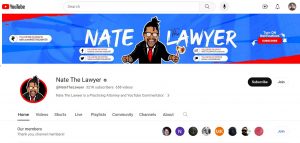LawTuber Loses Defamation Case–Broughty v. Bouzy
 Broughty, using an alias, runs the “Nate the Lawyer” channel, part of the LawTube community, with over a quarter-million followers and 27M views. Like many other LawTubers, he sided against Heard in his coverage of the Johnny Depp/Amber Heard trial.
Broughty, using an alias, runs the “Nate the Lawyer” channel, part of the LawTube community, with over a quarter-million followers and 27M views. Like many other LawTubers, he sided against Heard in his coverage of the Johnny Depp/Amber Heard trial.
Bouzy is CEO of Bot Sentinel, which claims it is a “non-partisan platform developed to classify and track inauthentic accounts and toxic trolls.” Heard retained Bot Sentinel. Bot Sentinel rated Broughty’s Twitter account “disruptive”; and on his personal Twitter account, Bouzy questioned Broughty’s legal credentials and accused Broughty of various misdeeds. Bouzy later recanted/withdrew some of the allegations (wait, whose Twitter account was more “disruptive”?). Broughty sued Bouzy for defamation and more.
The court says Broughty qualified as a limited-purpose public figure. “He purposefully sought public attention and followers by creating YouTube and Twitter content on matters of public interest, including analysis of the Depp–Heard trial and criticisms of Bot Sentinel.” As a result, Broughty must show that Bouzy had actual malice towards the accuracy of his assertions.
The court essentially characterizes Twitter as an anything-goes hellscape, at least when it comes to online feuds:
the “over-all context” in which the alleged defamation occurred here is Twitter. As both parties are well aware—given that both have engaged in calling out mistruths on the Internet—Twitter is a public forum where a reasonable reader will expect to find many more opinions than facts…Twitter is a forum where a user, “in the same setting and with the same audience, has the immediate opportunity to air his competing view” and thus may generally remedy any defamation with “self-help” rather than rely on litigation
The court is a little more concerned with Bouzy’s questioning whether Broughty was licensed as a lawyer. However, “Defendant’s tweets questioning whether Plaintiff was a lawyer are protected First Amendment speech because a reasonable reader would only view them as opinions, and the facts upon which they were based were disclosed, so ‘readers can easily judge the facts for themselves.'” Plus, Broughty used an online alias, so it’s understandable why Bouzy couldn’t confirm his license status.
As for Bouzy’s coarse language, such as calling Broughty a “grifter,” “liar,” “troll,” and participant in a “smear campaign,” the court says these “are clearly opinions in the context in which they were stated, and none of Defendant’s tweets making these remarks imply that they are based on undisclosed facts.”
Bouzy also alleged that Broughty engaged in criminal conduct, but the court says that’s OK because he showed his sources:
Defendant began the string of tweets about planting evidence with the words “New: Unearthed video of [Plaintiff] admitting he planted evidence” and a link to the video referenced, and his subsequent tweets continued to debate what Plaintiff’s words in the video meant, making it clear to the reasonable reader that his statements accusing Plaintiff of criminal conduct were “merely a personal surmise built upon” what Plaintiff said in this video. Similarly, Defendant’s tweet stating that Plaintiff “bragged to his @YouTube followers about illegally obtaining [Defendant’s] social security number” contained a link to a YouTube video. Readers were free to, and apparently many on Twitter did in fact, reach different conclusions as to whether Plaintiff admitted to any criminal conduct in these videos.
I’ve blogged several cases where courts have given online speakers wide latitude so long as they linked to their sources (e.g., this post), so this ruling is supported by precedent. Still, I’m not seeing any winners here. The way the court characterizes it, Bouzy seemingly sealioned and then name-called and falsely attacked Broughty, perhaps indirectly trying to rehabilitate Heard’s reputation? If so, I’m not exactly sure what constitutes a “troll” that anti-troll operations should track.
Case Citation: Broughty v. Bouzy, 2023 WL 5013654 (D.N.J. Aug. 7, 2023)
UPDATE: In response to an amended complaint, the court dismissed the complaint with prejudice. Broughty v. Bouzy, 2024 WL 1739866 (D.N.J. April 22, 2024)
BONUS 1: Lima Jevremovic v. Brittany Jeream Courville, 2023 WL 5127332 (D.N.J. Aug. 10, 2023), dismissing a defamation claim when:
Defendant frequently disclaims her commentary as a conspiracy theory, refers to herself as a conspiracy theorist, uses signals such as “I believe” & “I think”, & makes commentary on her social media page which is titled “Legal Edutainer”, all of which point to unactionable opinions rather than defamatory statements
Anything goes online nowadays if you publicly embrace conspiracy theories. ¯\_(ツ)_/¯
BONUS 2: Rosenblum v. Budd, 2023 WL 4938545 (Colo. Ct. App. Aug. 3, 2023). An impersonation Twitter account could be a “misappropriation” violation. Also, it could be defamatory if that account links to leaked private messages from the impersonation target. This latter ruling is especially dubious when the court says that 230 may not apply to the linked content.
BONUS 3: Reeves v. Woolford-Smith, 2023 WL 3563052 (Del. Ct. Common Pleas May 19, 2023). Defamation lawsuit over Facebook reviews fails at trial.

